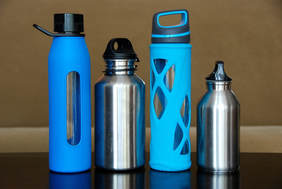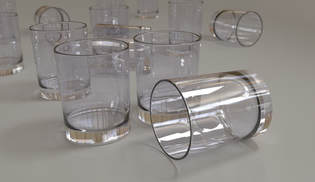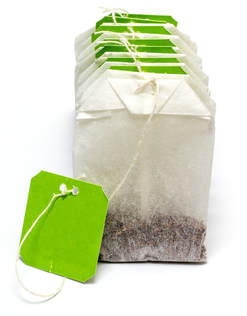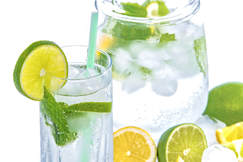and health. At birth the human
body is made up of around 70%
water which decreases with age; in
the elderly water comprises around
55%. The balance also differs
between the sexes with males generally holding more water, and females holding
more body fat. Water has functions both within and outside of the body's cells
providing a host-environment to maintain vital chemical processes.
To remain adequately hydrated - and to prevent dehydration - it is important that
water lost through essential bodily processes including breathing, sweating and
urination, is replaced. The frequently cited first signs of dehydration are a feeling
of thirst and a dry, sticky mouth; but by the time the body had noticed a reduction
in water, processed the deficit and sensed the need to respond with a 'feeling of
thirst' response the body is already dehydrated.
Other symptoms of dehydration include:
- feeling lightheaded
- headache
- lack of energy
- dark coloured urine
- poor concentration
Water plays a key role in vital processes within the body, including:
- formation and maintenance of blood plasma, tissue fluids and lymph
- effective passage of substrates into and out of cells (including circulation of
- nutrients via the blood and removal of waste)
- providing a suitable environment for chemical cellular processes
- provides lubrication to our joints and protection for our organs
- transportation and filtration of waste products for excretion
- maintenance of consistent body temperature and subsequent a cooling
One of the first pieces of advice my neurologist gave me was to make sure I made
a point of staying hydrated, especially when exercising. When I did some digging
around the research on this I realised how valuable it was. Dehydration had been
shown to make many of our MS symptoms worse, notably:
Fatigue
Much of the recent research on fatigue has looked at hydration status; not an
unexpected jump given that in people without MS a small drop in hydration can
bring on tiredness and confusion. This work is still ongoing but it seems it could
be a promising part of the fatigue-puzzle,
Urinary tract infections (UTI)
We know that some medications used to treat MS can irritate the bladder and
cause UTIs; but UTIs and bladder difficulties are a symptom and complication of
MS themselves. Some people with MS (PwMS) choose to limit their fluid intake to
try to avoid bladder difficulties, but this in itself can lead to development of UTIs
and subsequent dehydration.
Constipation
Adequate fluid intake is important to help to prevent constipation and bowel
difficulties; constipation has been shown - in some cases - to affect spasm and
spasticity and also aggravate bladder symptoms although specific mechanisms
remain unclear.
Heat-related exacerbations (Uhthoff's phenomenon)
Heat (and in some cases cold) has been shown to being about a temporary
worsening of symptoms; adequate hydration can help to maintain a consistent
body temperature to help to manage this.
The amount of fluid required depends on various external/environmental factors,
including:
- Environmental temperature
- Body temperature
- Humidity
- Physical activity
- Respiration rate
In the UK, drinks provide around 70-80% of our water needs with the remaining 20-30%
coming from foods such as soup, fruits and vegetables,
The guideline amount of fluid to consume per day for adults and the elderly is
2,000ml for males and 1,600ml for females. Guidelines for pregnant and lactating
women are slightly different (BDA, 2017). If you are interested in the guidelines
for children and infants drop me a note and I can send on separately.
Water helps to regulate body temperature which can be important when
exercising with MS. It is important to increase fluid intake whilst exercising in
order to replace fluid lost through increased respiration and sweating.
Common household
measures include:
1 medium sized glass = c.200ml
1 can of fizzy drink = 330ml
1 mug = c.250ml
1 cup = c.200ml
What types of fluid count?
Ultimately the type of fluid you consume is up to
you, however water (either tap, filtered or
bottled) is a healthy option. Tea and coffee
count too and can be a useful way of helping
elderly family and friends to drink more, but be
mindful of the caffeine content. Fizzy drinks
contain a lot of sugar as do fruit juices so should
be limited. Fizzy drinks can contain a lot of
chemicals, sweeteners and sugar which make
them a less-healthy option; they also contain
caffeine which can prove dehydrating and
counteract any benefit of fluid intake.
How can I tell if I'm drinking enough?
It can be tricky to know how hydrated you are; generally as soon as you feel the
first symptoms of dehydration (ie thirst and dry, sticky mouth) you will find a drink
which makes you feel better but you will generally stop drinking before you are
fully re-hydrated. The colour of your urine is the best indicator; if you are drinking
enough your urine should be straw-coloured or pale yellow in appearance.
Some lifestyle factors can affect how much fluid
you need...
Regardless of your fluid intake, some additional lifestyle factors can complicate
the body's absorption and use of water and bring about dehydration, Some of
these can include:
- caffeine
- salt
- sugar
- alcohol
bladder and affect symptoms which can further impact dehydration.
Some practical tips to
increase your fluid
intake
My husband calls me a camel (a bit rude
I feel) as I carry water everywhere; in my
handbag, in the car, gym bag etc and I
drink a lot of water. I suppose I'm lucky
as I don't dislike the taste of plain water, but said husband finds it 'boring' and
prefers it with some flavour.
Some easy/fun ways I've found to make it more interesting include:
- sliced fruit in a big jug in the fridge topped up with water. Favourites are:
- sliced lemon, lime, basil & cucumber, ginger and orange.
- sometimes I quickly squeeze half a lemon or lime into a water bottle to take
- out with us
- occasionally I freeze homemade smoothie into ice-cubes to pup into a large
- jug/bottle of water
- a friend uses the 'ten-glug rule' taken from a favourite US fitness couple,
- where every time you go to have a drink you must take 'ten-glugs' before
- putting it down
- to make water more interesting for children I have sometimes frozen
- blueberries, raspberries or chunks of strawberry into ice-cubes which can be
- fun when they melt (provided they like the fruit in the cubes!
References:
Active IQ (2016) ‘Hydration’ in Personal Training. London: Active IQ Ltd
Active IQ (2016) ‘The importance of adequate hydration’ in Fitness instructing
(gym) manual. London: Active IQ Ltd
British Dietetic Association (2017) Food fact sheet: fluid. Available online at:
https://www.bda.uk.com/foodfacts/fluid.pdf
Department of Health (2012) Manual of nutrition, Twelfth Edition. London: The
Stationary Office
MS Trust (2016) A-Z of MS: diet. Available online at:
https://www.mstrust.org.uk/a-z/diet





